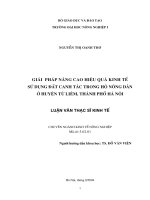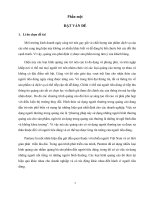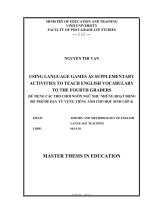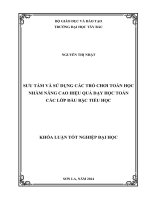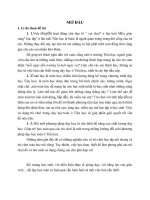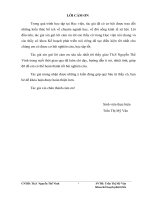Hiệu quả của việc sử dụng các trò chơi ngôn ngữ đến khả năng học từ vựng của học sinh lớp 5 tại trường tiểu học Trần Hưng Đạo
Bạn đang xem bản rút gọn của tài liệu. Xem và tải ngay bản đầy đủ của tài liệu tại đây (582.26 KB, 74 trang )
THAI NGUYEN UNIVERSITY
SCHOOL OF FOREIGN LANGUAGES
TRAN THI LIEN
THE EFFECTIVENESS OF USING LANGUAGE GAMES ON
VOCABULARY LEARNING ABILITY FOR THE 5TH
GRADERS AT TRAN HUNG DAO PRIMARY SCHOOL
(Hiệu quả của việc sử dụng các trị chơi ngơn ngữ đến khả năng học từ
vựng của học sinh lớp 5 tại trường tiểu học Trần Hưng Đạo)
M.A THESIS
Field: English Linguistics
Code: 8220201
THAI NGUYEN – 2019
THAI NGUYEN UNIVERSITY
SCHOOL OF FOREIGN LANGUAGES
TRAN THI LIEN
THE EFFECTIVENESS OF USING LANGUAGE GAMES ON
VOCABULARY LEARNING ABILITY FOR THE 5TH
GRADERS AT TRAN HUNG DAO PRIMARY SCHOOL
(Hiệu quả của việc sử dụng các trị chơi ngơn ngữ đến khả năng học từ
vựng của học sinh lớp 5 tại trường tiểu học Trần Hưng Đạo)
M.A THESIS
APPLICATION ORIENTATION
Field: English Linguistics
Code: 8220201
Supervisor: Dr. Nguyen Thi Huong
THAI NGUYEN – 2019
DECLARATION
I certify my authorship of the study report entitled
“The effectiveness of using language games on vocabulary learning ability
for the 5th graders at Tran Hung Dao primary school”.
In fulfillment of the requirements for the degree Master of Arts
Quang Ninh, September 23rd 2019
Trainee
Tran Thi Lien
This study was approved by:
i
ACKNOWLEDGEMENTS
I am deeply indebted to a number of people for helping me to make this M.A
thesis possible. First and foremost, my deepest gratitude goes to Dr. Nguyen
Thi Huong, my supervisor, who supported and encouraged me generously
throughout this study. Without her excellent academic guidance and support,
my thesis would not have been completed.
I would like to sincerely thank the anonymous participants who contributed
data to this study. Without their outstanding cooperation, this thesis would
not have been completed.
My appreciation is also extended to a number of staff members of
Department of Foreign Languages at Tran Hung Dao Primary school for
their assistance in statistical issues and for their assistance in editing work.
I would like to thank my family, especially my parents and my husband for
their constant source of love, support and encouragement in times of
difficulty and frustration.
Finally, I would like to thank my readers for their interests and comments on
this thesis.
While I am deeply indebted to all these people for their help to the
completion of this thesis, I myself remain responsible for any inadequacies
that are found in this work.
Tran Thi Lien
ii
ABSTRACT
This study is set out to investigatethe effectiveness of language games
used in classroom to enhance vocabulary learning among young learners. The
study adopts experimental research design, which involves both the use of
qualitative and quantitative methods. 70 fifth- grade students were divided into
two groups, controlled and experimental groups, whose average mean test scores
were similar. The experimental group received treatment with the use of games
to enhance their vocabulary learning while the controlled group was taught with
the traditional method. The findings show that the experimental group on
average scored higher than the controlled group in the post-test. The survey
questionnaire and observation also indicate that the students who were involved
in vocabulary games expressed a higher level of interest and engagement in the
lesssons and reported improvement in different aspects of vocabulary, including
spelling, pronunciation, meaning and use. The study puts forward suggestions
and implications for language teaching using vocabulary games for young
learners.
iii
Contents
CHAPTER I: INTRODUCTION ................................................................. 1
1.1.Rationale ................................................................................................1
1.2.Research context ....................................................................................5
1.3.Aims of the study ...................................................................................6
1.4.Research questions .................................................................................7
1.5.Scope of the study ..................................................................................7
1.6.Limitation of the study...........................................................................7
1.7.Thesis design..........................................................................................8
CHAPTER 2: LITURATURE REVIEW ..................................................... 9
2.1. Vocabulary ............................................................................................9
2.1.1. Concepts of vocabulary learning .......................................................9
2.1.2. Aspects of Vocabulary learning.......................................................10
2.2. An overview of Language Games .....................................................15
2.2.1. Definitions .......................................................................................15
2.2.2. Games categories .............................................................................15
2.2.3. Impacts of using games in vocabulary learning ability ...................16
2.3. Previous studies ..................................................................................18
CHAPTER 3: METHODOLOGY ............................................................. 21
3.1. Method of the study ............................................................................21
3.2. Research Design .................................................................................21
3.3. Participants..........................................................................................23
3.4. Data collection instrument ..................................................................23
3.4.1. Pre-test and Post-test ........................................................................24
3.4.2. Survey Questionnaires .....................................................................24
3.4.3. Classroom Observation ....................................................................25
3.4.4. Lesson Plan for group B ..................................................................26
3.5. Data analysis .......................................................................................27
CHAPTER 4: FINDINGS AND DISCUSSION ........................................ 28
4.1. Findings ..............................................................................................28
4.1. 1. Pretest and posttest result ................................................................28
4.1.2. Questionnaire and observation result...............................................29
4.2. Discussion ...........................................................................................31
CHAPTER 5: CONCLUSION................................................................... 36
5.1. Recommendation ................................................................................36
5.1.1.Tips for teachers in using language games for the fifth graders .......36
5.1.2.Criteria for choosing games in the English class of young learner...39
5.1.3. Top languages games for vocabulary learning ................................39
5.1.4. Techniques to teach English for young learners at primary school .43
5.2. Conclusion ..........................................................................................46
References .................................................................................................... I
Appendix .................................................................................................. VII
CHAPTER I: INTRODUCTION
1.1.
Rationale
Nowadays, the trend of globalization with both economic and cultural
integration among countries around the world makes learning foreign
languages became general movement of the world population. In 2015, the
ASEAN Economic Community was found; it allows free movement of
labor, which creates favorable conditions for professionals, skilled
workers of the ASEAN countries to engage in commercial activities and
cross-border investment in order to meet the shortage of human resources
for other countries. The integration among countries in the region and
around the world also improves labors’ income and gives valuable
experience for them, including Vietnam. Thus, foreign languages will be
the “gold ticket” of these labors, and the foreign languages proficiency is
inevitable and imperative requirement if you want to work with foreign
partners in the country as well as overseas.
Among foreign languages, English has been considered as “Lingua
Franca” (Foley, 2011) and the global language in the world. Therefore,
learning to communicate in English is important to enter and ultimately
succeed in mainstream English speaking countries. Working knowledge of
the English language can create many opportunities in international
markets and regions. In many countries, especially in Vietnam, teaching
and learning English has been paid attention more than ever before.
In learning English, knowing adequate vocabulary and how to use them
accurately plays an important role. Wilkins (1972, as cited in Alqahtani,
2015) wrote that while without grammar very little can be conveyed,
without vocabulary, nothing can be conveyed. Additionally, Schmitt
(2000) emphasizes, “lexical knowledge is central to communicative
competence and to the acquisition of a second language. Nation (2001)
1
further describes the relationship between vocabulary knowledge and
language use as complementary: knowledge of vocabulary enables
language use and, conversely, language use leads to an increase in
vocabulary knowledge. Indeed, people need to use words in order to
express themselves in any language. Most learners, too, acknowledge the
importance of vocabulary acquisition. In my experience as a teacher, I
noticed the fact that students usually find it difficult to speak English
fluently. They usually consider speaking and writing activities exhausting
because they keep on using the same expressions and words and very
soon, their conversation is abruptly interrupted due to missing words.
Moreover, the main reason for such communication problems is the lack
of vocabulary. Other students are confronted with the problem of
forgetting the words immediately after the teacher has elicited their
meaning or after they have looked them in the dictionary, and this a cause
of the lack of vocabulary.
However, there are some limitations in the effectiveness of the teaching
and learning vocabulary. According to Huyen and Nga (2003), in context
of Viet Nam, even though students realize the importance of vocabulary
when learning language, most Vietnamese students learn vocabulary
passively due to several factors. They consider the teacher's explanation
for meaning or definition, pronunciation, spelling and grammatical
functions boring. In this case, scenario, language learners have nothing to
do in a vocabulary learning section but to listen to their teacher.
Vocabulary games are proposed to solve the problem. Language games
bring in relaxation and fun for students, and they will learn and retain new
words easily. Games create the motivation for learners of English because
of the competition between students. Vocabulary games bring real world
context into the classroom, and enhance students' use of English in a
flexible, communicative way (Huyen and Nga, 2003).
2
Although we are all aware of the importance of learning English,
especially the vocabulary, the best way to learn vocabulary is still
controversial. Some recent suggestions are the use of language games to
help students learn vocabulary better.
According to Freeman (1986), learners enjoy language games they enjoy
communicative involvement in the classroom. He believes that games can
provide a healthy and constructive competition. Games can encourage
learners discovering and voluntary involvement to the learning process, it
can establish a better bonding between teacher and learners. Finally, a
good designed language games can create a real communication context in
the classroom, which can help learners to improve their speaking ability
Some researchers such as Nguyen and Khuat (2003) and Uberman (1998)
have shown that students are tired of learning vocabulary in traditional
methods such as rehearsing, writing words on papers or learning passively
through teacher’s explanations, and this has created severe problems with
learning skills. Nguyen and Khuat (2003) believe students prefer to learn
language in a relaxed environment such as vocabulary games. They
believe that in an interesting and communicative class learners can learn
80 percent of what they exposed to.
Laufer (1997) also argues that if fluency is understood as the “ability to
convey a message with ease and comprehensibility”, then vocabulary
adequacy and accuracy matter more than grammatical correctness.
With Hansen (1994) one of the advantage of the language game is that it
can provide opportunity for shy students to involve voluntarily in
classroom activities.
Lewis (1999) argued that games are popular among children because they
like to play. Through games, young learners could interact, discover, and
experiment with their surroundings. Using games not only enhances
students’ motivation, but also provide an incentive and stimulus to use the
language.
3
Vernon (2009) argued that games are an effective tool to teach vocabulary
to young learners. Children participate and pay more attention because
they enjoy themselves in the classroom, feel and do better during and after
the game. Repetition will be less boring and fun for children to which
consolidates their learning of new words.
Huyen Ang Nga, (2003) and Uberman, (1998) agreed that games create a
fun and relaxed atmosphere where young learners could learn fast and
retain words better.
According to Allen (1983), games are important in teaching vocabulary
because they highlight the necessary and important words to achieve the
objectives of the game.
Harmer (2008) stated that in order to have the ability to speak English
fluently, young learners need to have the ability to know the language
features and to process information immediately. Therefore, young
learners must practice through appropriate variety techniques that aid their
information process and simultaneous operations of the language.
Talking about applying language games on learning vocabulary, Abdikhah
(1998) states from the psychological point of view, games have many
benefits. They can reduce inhibition of the learners especially if they are
cooperating in the games not competing. The shy and timid students who
do not show any tendency to participate in activities will feel more at ease
and will participate more freely. According to Nguyen and Khuat (2003),
using games provides a relax and fun environment for learners, therefore,
help them to learn better. They believe learners interested in friendly
competition, which motivate them to voluntarily involvement in the
classroom tasks.
The purpose of this thesis is to learn whether applying language games on
vocabulary learning ability is effective. To do the aforementioned
effectively, we need to investigate and contrast the interaction between
4
teachers and students in using language games on vocabulary learning
ability for the fifth graders at Tran Hung Dao primary school.
1.2.
Research context
Tran Hung Dao Primary School was established on August 11th, 1999,
located in Tran Hung Dao Ward, Ha Long City, Quang Ninh Province and
officially went into operation on August 10th, 2000. The school was
established on the basis of merging primary schools of 3 schools with a
long track record of teaching and learning, namely Trong Diem Secondary
School, Kim Dong Secondary School, and Vietnamese - French bilingual
block of Bach Dang Primary School.
Thanks to the attention of the leaders of the Party, Government, and
Education Department of Quang Ninh Province, the school has been
equipped with a new, spacious and clean facility with a total investment of
up to VND 7 billion right from at the beginning of the establishment. The
construction structure is quite complete including a 3-floor school
building with 15 rooms and a 2-floor building with full function rooms
such as board room, informatics room, the office of the school board,
room of accountant, administrative, library, medical and team accountants
... After more than 1 year of operation, the school built another 3-floor
study area with 15 classrooms.
With relatively complete facilities and qualified teachers with many years
of experience in learning and teaching, right in the opening ceremony of
the first school year, teachers and students the school was very excited and
proud to be the first school in the province to be honored. The recognition
of Tran Hung Dao primary school in international standards in 1996-2000
is a major turning point of the school, marking an important milestone on
the road of construction and development of the school.
In addition to the quality of teachers, the attention from leaders of the
Party, Government, and Education Department of Quang Ninh Province,
5
the contributions of parents and students, the relentless efforts to maintain
the cultural and sports activities of the school also create conditions and
motivation to help the school always fulfill its assigned tasks and lead in
the primary block of Ha Long City.
For many years of teaching English in elementary schools, teachers have
shared some of the games they often apply and think to be very effective
in teaching curriculum. These games can be used to check vocabulary or
for vocabulary practice to improve communicative competence for all
students. Especially for weaker students, the games aremore effective.
Therefore, the study of “The effectiveness of using language games on
vocabulary learning ability for the 5th graders at Tran Hung Dao primary
school” should be carried out.
1.3.
Aims of the study
Learning vocabulary is a part of learning any language, one should think
of the way to achieve that goal. The traditional methods for learning
unknown vocabularies have not been so successful and students as well as
teachers are tired of the routine ways of teaching words. Learners also
tend to be autonomous in their learning and they want to have control in
their leaning.
Thus, this study aims to investigate the effects of using language games on
vocabulary learning ability for the 5th graders at Tran Hung Dao primary
school and how the students feel about these activities.
There are the objectives as:
i.
Explore the effects of using language games on vocabulary learning
ability for the 5th graders at Tran Hung Dao primary school.
ii.
Explore the students’ feeling toward to language games on vocabulary
learning in English classes.
iii.
Find out suggestions of using language games on vocabulary learning
ability in teaching and learning process.
6
1.4.
Research questions
1. What are the effects of using language games on vocabulary learning
ability for the fifth graders at Tran Hung Dao primary school?
2. What are the students’ attitudes toward to language games on vocabulary
learning in English classes?
1.5.
Scope of the study
This section provides information about the scope of the study. It provides
information regarding the scope and scope that has been dealt with in this
study.
The research is studied on the fifth graders at Tran Hung Dao Primary
School that explore the effectiveness of using language games on their
vocabulary learning ability. The respondents are 70 students in grade 5.
Study duration: 3 months, 2 periods/ week. Moreover, the research is
carried out in 2019.
1.6.
Limitation of the study
Limitation provides barriers that researchers encounter in the survey
process as well as during the study.
There are many things that researchers cannot control, which greatly
influences research results, making the survey inaccurate and unreliable.
Below are the limitations that we can easily see.
The results are based entirely on survey participants and observations, so
the results are not highly precise.
In fact, there is not much research on English listening skills in Tran Hung
Dao Primary School, and this limits the data source for reference.
Researchers are not allowed to choose more people to participate due to
the influence of the scope of research.
Due to the disallowed condition, the researcher was only given a very
small sample, only a few people could participate in the survey, so the
7
survey questions are chosen as general as possible to get general
information.
The students selected for the survey, only in grade 5th, do not have much
experience to answer the questions correctly, some are afraid, others rely
on the opinions of people around them, so the surveyors must support a lot
when doing the survey, this takes a lot of time and the information
obtained is not accurate.
1.7. Thesis design
Chapter I is introduction part in which topic background; Tran Hung Dao
primary school’s info; rational to the study; the aim of the study; research
question; scope of the study and limitation of this study are presented.
Chapter II is Literature review part in which concepts of vocabulary,
language games, as well as previous researches are presented.
Chapter III is research methodology content. The study presents some
definition, Research procedure, Data collection instruments; data
collection and Data analytical method.
Chapter IV is findings and discussion content after analyzing data.
Chapter V presents conclusion and recommendation of the study.
Moreover, limitation of the thesis and Suggestions for Further Research
are also presented.
8
CHAPTER 2: LITURATURE REVIEW
2.1. Vocabulary
2.1.1. Concepts of vocabulary
Undeniably, having a good vocabulary will help you to improve your
language level and become a more confident speaker of English.
The concept “vocabulary” is defined in a variety of ways basing on
different term of vocabulary.
According to Hubbard (1983), vocabulary can be defined as a powerful
carrier of meaning.
Jackson and Amvela (2000) say that the terms of vocabulary, lexis, and
lexicon are synonymous.
Hornby (1995) defines vocabulary as ''the total number of International
Journal of Teaching and Education Vol. III, No. 3 / 2015 24 words in a
language; vocabulary is a list of words with their meanings”.
In addition, Burns (1972) defines vocabulary as" the stock of words that is
used by a person, class or profession.
According to Zimmerman cited in Coady and Huckin (1998), “vocabulary
is central to language and of critical importance to the typical language
learning”.
According to Richards (2002:255), vocabulary is the core component of
language proficiency and provides much of the basis for how well learners
speak, listen, read, and write.
Nunan (1999: 101) states that vocabulary is a list of target language
words.
Additionally, Diamond & Gutlohn (2006) suggest that vocabulary is the
knowledge of words and their meanings. This means that without
establishing a strong vocabulary base first, comprehension and use of a
9
language will not be achieved. In addition, the student should be able to
recognize words, and know their meanings as well.
Talking about vocabulary, Lehr, Osborn, and Hiebert (in Kamil and
Hiebert, 2005: 2-3) define vocabulary as knowledge of words and words
meaning in both oral and print language and in productive and receptive
forms. More specifically, they use it to refer to “the kind of word that
students must know to read increasingly demanding text with
comprehension.”
Furthermore, Diamond and Gutlohn (2006) in
“www.readingrockets.org/article state that vocabulary is the knowledge of
words and word meanings.”
From the definitions above, it can be concluded that vocabulary is the total
number of words that are needed to communicate ideas and express the
speakers' meaning. That is the reason why it is important to learn
vocabulary.
2.1.2. Aspects of Vocabulary
2.1.2.1. Form
Pronunciation
In order to learn vocabulary and communicate in a foreign language in the
same manner as a native speaker, the learner must achieve a certain level
of accuracy and fluency of the words. Other factors, such as flexibility,
tone and size (volume and length) of speech, are also believed to affect
learners’ ability to speak (Hedge, 2000). Accuracy and fluency, however,
are still of greatest interest, as these two factors appear to surface on the
top most noticeable to communicators.
However, while the study of language in general and language teaching
and learning in particular, one issue that remains controversial is which of
these two factors is more important and more important. Bipolar trends
10
change over time, but now the trend focuses on message-oriented attention
to fluency rather than accuracy.
The concept of accuracy, therefore, is somewhat "forgotten". Although the
current movement does not spend much of the paper on 'accuracy in
language' as it deserves, the notion, clearly expressed in the
communicative ability of the communicator, still plays an integral role in
the process of teaching, learning and mastering a language.
One of the problems of English learners is that they have to encounter
rhythm and intonation. Rhythm and intonation are the "music" of English.
Besides worrying about the sound of individual sounds, the students are in
big trouble speaking. Intonation in English is made up of natural stop
points. Native people stop naturally between sentences. They speak the
language according to the sentence, according to the short language. Since
they speak mainly in English, they are very clear and easy to understand.
In contrast, many students learn English by memorizing singular words
and when they say, they say one by one. This led them to often stop in
quite strange positions. They form groups of unnatural words. This leads
to very strange and unnatural rhythms that are hard for locals to
understand. This makes both the listener and the speaker frustrated. This
can be changed by learning English words by sentence and by speaking
English in context. The learners will learn phonetics, intonation, sound,
swallow the sound in that sentence, then pronounce a standard sentence
and know how to break the rhythm.
Word stress
English is a multi-syllable language; words with two or more syllables
always have a pronounced syllable different from the other syllables in
terms of length, height and height. Which syllables are pronounced louder,
higher and longer than the same syllables of the same word, we say the
syllable is stressed. On the other hand, the syllable falls into that syllable.
11
When looking at the transcription of a word, the stress of that word is
indicated by a sign (') in front, above the syllable.
For example,
Happy / 'hæpi / stress falls on the first syllable
Clever / 'klevər / stress falls on the first syllable
Arrange / ə're nd
/ accent falls on the second syllable
Engineer /
'n r / has two stresses: the main stress falls on
end
the third syllable / nir / and the secondary stress falls on the first syllable /
en /
Japanese /
d æpə'niː z / main stress falls on the third syllable /
niː z / and the auxiliary stress falls on the first syllable / d æ /
Word stress plays an important role in distinguishing words from other
words as the learners listen and speak English. Native speakers pronounce
words so naturally that they do not know they are using accents.
Therefore, the emphasis on syllables or not using accents will make it
difficult for native speakers.
For example:
From desert, there are two accents:
The accent falls into the first syllable / 'dezərt / it is a noun,
meaning desert,
However, the accent falls into the second syllable / d 'z rt / verb,
meaning abandonment, desertion.
In English, there are some words, which are written alike, but the accents
in different places depend on the type. Thus, the correct pronunciation of a
word is the first element that helps students to understand and speak as
native speakers.
Spelling
In "phonics", children will learn to read and be familiar with the letters.
They have the ability to communicate and pronounce very well, they will
12
match the sounds, which they know with the letters that they do not know
to learn to read.
For example, with the word "met", read the three sounds: "m" - "e" - "t".
The process of learning from simple to complex. In the US, there is a
game; adults read a word hard to children rewrite correctly. Written
correctly will be the point. This is different from Vietnamese children,
often knowing the script before learning how to pronounce it, (Sprinkel,
2000). Americans learn by ear. When they meet a new unknown word,
they will simply ask or notice how other Americans pronounce it. Then,
they just "copy".
If people ask an American about IPA, for example, "short" and "long",
they will sometimes confuse. Perhaps they will contemplate the difference
after an analysis, but the Americans speak according to their habits and in
their ears more than the typeface. In contemplation, almost everyone in
the world learns by listening, (Schreiber, 2013).
2.1.2.2. Meaning
In English, there are nearly 100,000 of relative words. An indigenous
English speaker can know 10,000 pronunciations (common) up to 20,000
unaccented. Professor Nation points out that each person needs to know
between 8,000 and 9,000 words in order to be comfortable reading a book.
Studying a mother tongue re-learner shows that a person with a
vocabulary of 2,500 passive words and 2,000 proverbial words can speak
fluently in one language, (Luther, 2018).
Before starting to learn vocabulary, the learners must understand the
difference between each word in a word family. By doing this, they will
know how to use words more easily. A word family is a group of words
derived from the same root, (Dahlgren, 2008).
For example, active, activities, and activity are words in the same
family.There is a difference between passive and active words. Passive
words are used when reading and listening, as you receive information.
13
Active words are used when writing and speaking, as they are
communicating. In case the learners want to become proficient, they do
not have time to think because the meaning of fluency is to communicate
in a smooth and easy way, (Alqahtani, 2015). Thus, the learners should set
themselves the goal of developing their vocabulary in depth instead of
broadening it.
2.1.2.3. Use
The best way to memorize vocabulary is to deepen it, and to use it the
students have to learn and remember the vocabulary by sentences and
contexts. In traditional English classes, in schools and textbooks, when
learning vocabulary one often breaks down into sections and each one has
a list of words that the learner must remember. Often, at the end of the
lesson, the learners will see the words and the meaning of the words in
their own language.
People learn words from that list and try to remember them for the test.
Then, perhaps, the learner will forget, (Sinhaneti and Kyaw, 2012). That is
the traditional way of learning today. Unfortunately, this method of
learning is not effective, because it forces learners to think too much when
the learner just speaks easily and automatically, (Sinhaneti and Kyaw,
2012).
In a certain sense, sentences give the learners a lot of information. They
give the students more information than they can gather from a single
word. Sentences are often easier to remember, because they mean deeper,
giving them a picture or story, especially when they learn and use it from
what they hear or read, (BCcampus, 2018).
This is even true in the case of English: one can assess a person's
education and social status through his phonetics (McDowall, 2002).This
means that if an English learner wants to be able to use the language as a
native speaker, and wants to be academically acclaimed, he or she must
improve his or her vocabulary.
14
However, for learners of English as a foreign language, learning and
mastering pronunciation is a major obstacle because the orthography of
the English language is "infamously useless" if one wishes to infer the
pronunciation of a word from the word (Lecumberri and Maidment,
2000).
2.2. An overview of Language Games
2.2.1. Definitions
There have been different ways to define games. The term “games” is
defined as “a system in which players engage in an artificial conflict,
defined by rules that result in a quantifiable outcome.” (Salen &
Zimmerman, 2003). Additionally, McDonough (1993) stated, “Gamebased activities can involve practice or oral strategies such as filling in
questionnaires and guessing unknown information. Even though these
activities are called games, there by implying fun, they are also
communications based and require the learners to use the information they
find out in a collaborative way for successful completion of a particular
task” (p. 564).
Playing games is essential in foreign language learning and development
because it contributes to the cognitive, physical, social and emotional
well-being of children (Ginsburg, 2007).
It has the paradoxical effect of increasing a child’s attention span and
improving the efficiency of thinking and problem-solving (Goldstein,
2012), an essential skill when learning a foreign language.
Games also increase brain development and growth and have the power
to establish new neural connections (Manichander, 2016).
2.2.2. Games categories
Classifying games into categories can be difficult because categories often
overlap.
15
Hadfield (1999) proposes two ways of classifying language games. First,
language games are divided into two types: linguistic and communicative
games. Linguistic games focus on accuracy, such as supplying the correct
antonym. Communicative games presuppose successful exchange of
information and ideas. Hadfield also offers to classify language games
into many more categories: sorting, ordering, or arranging, information
gap games, guessing, search games, matching games, labeling,
exchanging games; board, role play games.
According to W. Lee (1991), games can be classified into ten categories:
structure games which provide experience of the use of particular patterns
of syntax in communication; vocabulary games in which the learners’
attention is focused mainly on words; spelling, pronunciation games;
number games; listen-and-do games; games and writing; miming and role
play; discussion games.
There are some linguistic games or communicative games, some games
will contain elements of more than one type: (1) Sorting, ordering, or
arranging games; (2) Information gap games; (3) Guessing games; (4)
Matching games; (5) Search games; (6) Exchanging games; (7) Labeling
games; (8) Board games; (9) Role play games, (Klimova, 2015).
2.2.3. Impacts of using games in vocabulary learning
The above games help students play while learning not only in class but
also in everywhere, everywhere, while also examining vocabulary
effectively. Games attract students to take lessons, especially reading
comprehension, conversation to introduce the topic. In addition, it can be
used in extracurricular programs, English clubs, or encourage students to
practice in groups. The games also train their ability to judge, create, train
reflexes quickly, decisively, confidence, create a happy atmosphere.
Games help the teacher to create contexts in which the language is useful
and meaningful. Even though games are often associated with fun, we
16
should not lose sight of their pedagogical value, particularly in foreign
language teaching and learning. Games are effective as they create
motivation, lower students’ stress, and give language learners the
opportunity for real communication.
Games have both positive and negative impacts on vocabulary learning.
Firstly,Games promote learners’ interaction. Interaction comprises the
nature of classroom pedagogy and classroom behavior. According to
Hansen (1994), one of the advantages of the language game is that it can
provide opportunity for shy students to involve voluntarily in classroom
activities because pair or group work is one of the main ways to increase
cooperation and involvement.
Secondly, Games improve learners’ language acquisition. Thanks to the
motivation and interaction created by games, students can acquire
knowledge faster and more effectively than by other means. Games can
stimulate and encourage students to participate in the activity since they
naturally want to win. Apart from having fun, students are learning. They
acquire a new language.
Next, Games increase learners’ achievement. Games can motivate
learners, promote learners’ interaction, and improve learners’ acquisition.
As a result, games can increase learners’ achievement, which means that
learners’ test results, ability of communication, knowledge of vocabulary,
or other language skills can improve.
However, games also have lots of negative effects and drawbacks on
learning vocabulary.
First, it is hard to control time of speaking mother tongue of players.
Second, it takes much time and effort to prepare and implement games.
Teachers must find out or design suitable games, (Sigurðardóttir, 2010).
When teaching vocabulary, they have to instruct their students to play
games, which make presentation, explanation and practice of new words
17
shorter. The other cons are noise during the time of playing games,
(Bakhsh, 2016). This can affect the classes nearby.
In short, although games bring some negative impacts, it is an effective
and worthy ways to apply into teaching vocabulary.
In fact, with the teacher classes held English games, students are very
interested in learning hours; understand the deeper and more natural, less
the inherent timidity. With some classes, teachers do not put the game in
the classroom, students may be afraid to speak; knowledge is not deep,
afraid to attend school, not interested in the subject, (Talak-Kiryk, 2012).
However, in order for the game to be effective, the teacher needs to be
well prepared and flexible in time, and select the appropriate game for the
lesson. Teachers also need to be prepared for the necessary equipment. In
the process of organizing the game must go from easy to difficult, should
not reverse it. When the student loses, the penalty should be gentle, subtle,
encouraging students to try more next time. When playing, do not be
biased or discriminate gender, or deliberately penalize any children,
(Fisher, 1995).
While playing an English game, the clutter in the classroom is
unavoidable. This is likely to affect other classes, so the teacher must
really be a dynamic host, solving every situation. Surprisingly, it is
possible to play a game effectively, (Thuy, 2015).
2.3. Previous studies
For the use of games that are highly effective in teaching and learning
English, many authors have saved the importance of having teachers use
the game as an integral part of teaching the language. The research
focuses on popular game organizing activities to help students participate
in classrooms, create a fun, relaxed, enthusiastic and collaborative English
atmosphere. In addition, the research also found the games that match the
level of students. The game will be difficult to implement if its
18
